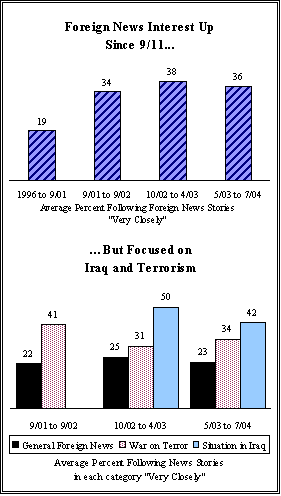
Barring a sizable shift in public opinion over the next few months, the 2004 election will be the first since the Vietnam era in which foreign affairs and national security issues are a higher public priority than the economy. Currently, four-in-ten Americans (41%) cite international and defense issues such as the Iraq war and terrorism as the most important problems facing the country, while just a quarter of the public (26%) offers economic concerns. And both Pew Research Center and Gallup surveys show that, if anything, the public’s focus on foreign and security issues is increasing as the campaign progresses.
An analysis of Gallup Poll data from 1948 through 2004 shows that foreign policy and international security issues dominated elections during the early part of this period (1948-1972).

On average, foreign and security concerns were cited as the most important national problem at least twice as often as economic concerns during these seven presidential elections peaking in 1968 when foreign and security concerns were mentioned nine times for every single mention of the economy. (Note: Data generously provided by the Gallup Organization.)
This changed markedly beginning with the election of 1976. From that point through the election of 2000, economic issues were, on average, cited as the most important problem facing the nation at least twice as often as international and security issues. This ratio peaked in 1992, when there were fully 18 mentions of the economy as the most important problem facing the nation for every one mention of foreign, defense, or security issues.
In the current campaign, however, foreign policy is once again assuming much greater importance. Taking the average of Gallup surveys conducted between January and July, about as many respondents have identified foreign and security issues as have mentioned economic concerns as the most important problem facing the nation. Moreover, the proportion citing foreign and security problems has been rising. In a January Pew Research Center survey, 37% cited international or security problems, while 35% listed economic concerns. But by July, the number citing international or security problems most notably Iraq (25%) and terrorism (8%) rose to 41%, while a net of 26% cited any kind of economic concerns.
Foreign News Interest

The increased importance of international and security issues following Sept. 11 and the U.S. military action in Iraq coincided with a spike in public attention to foreign news. The proportion who say they follow international affairs “very closely” rose from 14% to 21% from 2000 to 2002 in Pew’s Biennial Media Consumption study, and inched even higher to 24% in April of this year. Moreover, asked whether they follow international news closely most of the time or only when something important is happening a majority (52%) this year say the former. In 2000, more said they followed only when something important is happening by a 64% to 33% margin.
An analysis of the Center’s monthly measure of public news interests bears out the increased attention to news about international events and national security. In the five years prior to the 9/11 attacks, the average news story that involved events overseas and international affairs was followed closely by just 19% of Americans. This rose to 34% in the year following the attacks, and reached as much as 38% during the buildup to military action in Iraq.
Not surprisingly, most of this increased attention has been focused on news about Iraq and issues related to terrorism. In the year following the attacks, news about U.S. military action in Afghanistan and other terrorist incidents were followed very closely by, on average, 41% of Americans. Public attention to foreign news not related to terrorism during this period was not substantially different from what it was before the attacks.

Iraq dominated the public’s news attention from October 2002 through April 2003, with half of Americans following news about the situation in Iraq very closely in a typical month. News interest in Iraq has dipped somewhat over the past year, but roughly four-in-ten (39% in the current survey) say they are following news about Iraq very closely.
The Center’s news interest database shows that the public’s appetite for overseas news that is not related to terrorism or Iraq remains somewhat limited, however. For example, in both 1994 and again a decade later, violence and civil unrest in Haiti drew little public attention (14% in 1994, 15% in 2004). Only after U.S. forces were sent to Haiti late in 1994 did a sizable proportion (31%) turn their attention to the situation.
The same pattern is evident regarding news about ethnic violence in Africa. In 1994, only 12% followed news about ethnic violence in Rwanda very closely. This is virtually identical to public attention to news from Sudan in July of this year (14% following very closely). Taking the average from all types of overseas news stories that are not linked to Iraq or terrorism together over the past two years reveals that roughly a quarter of Americans follow such news very closely. This is up only slightly from the overall foreign news average of 19% prior to the 9/11 attacks.




